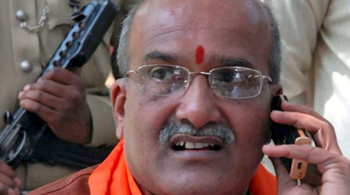Panaji, Jan 17: Sri Ram Sene leader Pramod Muthalik and his associates have been banned from entering poll-bound Goa for 60 days beginning tomorrow as authorities fear "serious law and order problems" if they are allowed to enter the state during the period.
 Stating that election code of conduct has already been in place, the administration said in its order, "If Muthalik or any of its (Sene's) associates are not prevented from taking entry in the State of Goa, then the same could lead to serious law and order problem and the aggressive statements of Muthalik will certainly affect peace, harmony and will create fear in the minds of public and tourists."
Stating that election code of conduct has already been in place, the administration said in its order, "If Muthalik or any of its (Sene's) associates are not prevented from taking entry in the State of Goa, then the same could lead to serious law and order problem and the aggressive statements of Muthalik will certainly affect peace, harmony and will create fear in the minds of public and tourists."
Goa will go to polls to elect 40-member House on February 4.
The order cited a report from Superintendent of Police, North Goa, stating that entry of associations/members of Sri Ram Sene and its leader Muthalik is to be prohibited as their aggressive statements and comments could hurt the feeling of certain groups and create possibility of violence and serious law and order problems.
"This could adversely affect peace, harmony and create fear in the minds of the public and tourists," as per the order.
In 2009, the Ram Sene men had allegedly attacked a pub in Mangalore, where women were beaten up. Muthalik had defended the attack saying that girls going to pub was against Indian culture.
Following the attack, the BJP government of Karnataka banned him from entering Mangalore. In response, he campaigned against BJP in the 2009 Lok Sabha elections, calling it "corrupt and anti-Hindu".
In 2014, Muthalik joined the BJP's Karnataka state unit, only to be forced out within hours after protests from other members.







Comments
What a joke! BJP is banning BJP (literally) not to enter Goa.....
We are lacking somewhere....
Being an Indian citizen he has right to visit any place in India. Stopping some one is not right decision. Instead we should have had stun IP Code to put some one behind bar and no option to obtain bail or release if disturb the hormony of the country...
Banning Owaisi, Togadia, Mutalik so on does it solve the problem ????
Send him to Indian Border.
Sena ka kutha na ghar ka na ghat ka.
Peace loving citizens must kick such creatures from the root. Not to respond for foolish statements. Even dirty mind set politicians also stop their double mind back door support. Hope all understood about such kind of supporters. Specially appearing in south kanara region for their party benefit.
Jai Hind!
Good move by BJP govt...
Add new comment